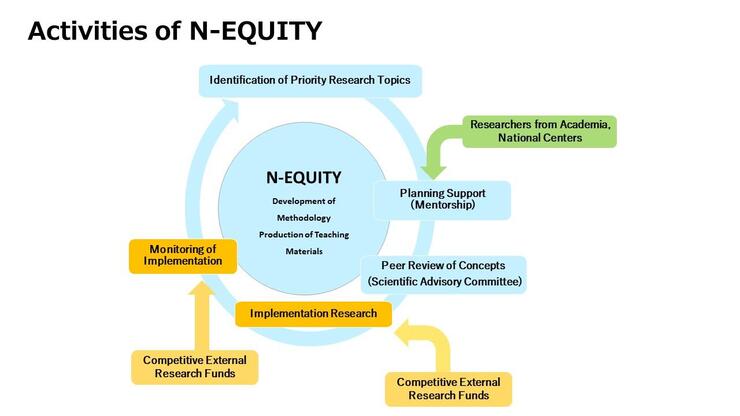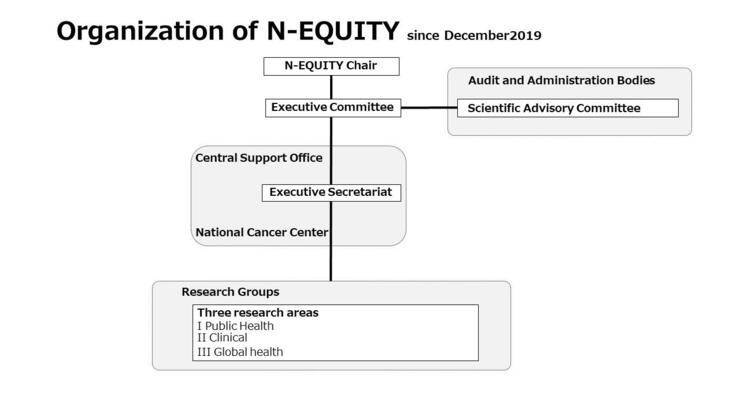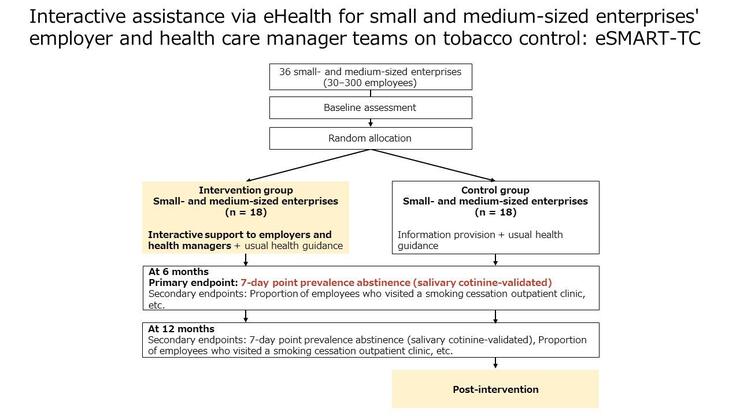Project to develop infrastructure for promoting implementation science
Research outline
At the National Center Consortium in Implementation Science for Health Equity (N-EQUITY; established in December 2019), six national centers for advanced and specialized medicine (national centers)* collaborated to build a foundation for the promotion of implementation science under the support of cross-sectional research promotion grants from the Japan Health Research Promotion Bureau (JH).
Implementation science is the study of methods to promote the adoption and integration of evidence-based interventions (EBIs) into daily activities in medical and public health settings. It covers a broad range of themes, from prevention, early detection, and treatment of diseases to supportive care, survivorship, and palliative care.
However, currently, the methodology and importance of implementation science are barely recognized in Japan. In this project, six national centers specializing in different areas will work together to help researchers conduct research projects in the areas of prevention (cardiovascular diseases, diabetes, cancer, and so on), survivorship, and palliative care (heart failure, chronic obstructive pulmonary disease, dementia, and cancer), and widely disseminate the results as model cases of implementation research to increase awareness of the importance of implementation science.
*National Cancer Center, National Cerebral and Cardiovascular Center, National Center of Neurology and Psychiatry, National Center for Global Health and Medicine, National Center for Child Health and Development, and National Center for Geriatrics and Gerontology
Expected outcomes
N-EQUITY will drive forward implementation research by building a system to support researchers. Through these activities, the group aims to develop and test methods to enhance the adoption, implementation, and sustainability of EBIs in the real world (implementation strategies), with the ultimate goal of extending healthy life expectancy and attaining health equity.
- We will identify themes that address evidence-practice gaps (a state in which EBI is not fully implemented in practical settings) and require implementation research in Japan.
- We will establish a scientific advisory committee, in which various stakeholders such as patients, citizens, related companies, medical professionals, government agencies, and researchers participate as members, working to establish a system that enables high-quality peer review of research concepts.
- We will establish a monitoring system to measure implementation achievements and create an effective circular model of research and practice.
Research progress and outcomes
1) Publication of a Japanese translation of the "Consolidated Framework for Implementation Research (CFIR)"
In collaboration with the Research Association for Dissemination and Implementation Science in Health (RADISH), a Japanese translation of the CFIR was issued and published on March 15, 2021.The CFIR identifies why gaps in evidence and practice exist and provides clues on how to address them.
2) Publication of a Japanese translation of "Implementation Science at a Glance: A Guide for Cancer Control Practitioners"
This book is a translation of a guide for cancer control practitioners published by the National Cancer Institute (NCI) (https://cancercontrol.cancer.gov/sites/default/files/2020-07/NCI-ISaaG-Workbook.pdf) (link to external site). This book provides a systematic approach to implementing EBIs in four stages: assessment, preparation, implementation, and evaluation. In addition, case studies are included at the end of the book to provide a concrete understanding of how these steps work in actual practice. This book brings together the essence of implementation science that is common not only in the field of oncology, but also in a variety of clinical settings and public health fields.
3) Identification of priority research topics to be addressed in implementation research
We created a list of prioritized themes for implementation research. Mentors were assigned to the themes, and support plans covering all steps from planning to completion of implementation research have been proposed.
4) Providing a consultation service about implementation research
We opened the N-EQUITY website to accept proposals and consultations on implementation research from national centers and other institutions.
5) Establishment of a peer review process by the scientific advisory committee for implementation research concepts
N-EQUITY forms a scientific advisory committee comprising external experts, including patients and citizens, to review implementation research concepts. The scientific advisory committee reviewed the phase 2 implementation trial entitled "Interactive assistance via eHealth for small and medium-sized enterprises' employer and health care manager teams on tobacco control: eSMART-TC" as the first research project and approved it as the N-EQUITY2101 study (January 20, 2021). The scientific advisory committee conducted peer reviews of six studies.
Message from the principle researcher
The name N-EQUITY reflects the passion and altruistic wish of all of those involved in working together in implementation science to attain health equity. N-EQUITY will work with the public, health and welfare officials, and researchers to establish a sustainable research support system based on the objectives of the six national centers and national policies and aim to extend the healthy life span of citizens, patients, and their families. We hope that we will be able to achieve our goals and foster many young researchers.



